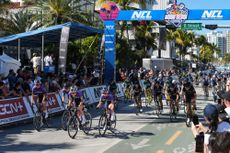Improved endurance and reduced pain: New video explains the performance enhancing benefits of coffee when cycling
Cross-discipline rider Juliet Elliott explains her daily coffee routine

It goes without saying that the cycling world and coffee are almost inseparable, but have you ever wondered about the science behind the performance enhancing benefits of the ubiquitous bean-brewed beverage?
In a new video, multi-discipline rider Juliet Elliott and the Institute for Scientific Information on Coffee have set out all the perks to sinking a flat white before your ride, revealing how much faster the drink could make you.
Of course the real secret to coffee’s performance enhancement is in the caffeine, the natural stimulant found in tea, coffee and cacao plants, but how does caffeinated coffee help your performance when compared with the decaffeinated alternatives?
Elliott, a cross-discipline bike racer and YouTuber, said: “I normally train for around twelve hours a week and take part in endurance, gravel and bikepacking races and events such as Grinduro and Tuscany Trail. What I eat and drink is critical to my performance and I enjoy coffee being a part of my daily routine.
“I always start my day with a coffee, enjoying the first one with breakfast then usually having another before I head to the gym or out on a ride. I’m a big fan of coffee, it makes me feel energised and mentally alert, plus I’m fully aware of the performance benefits - I can pedal harder, faster and for longer.”
Elliott’s coffee routine will resonate with many cyclists, but what is the science behind the feeling.
The Institute for Scientific Information on Coffee, a not-for-profit organisation set up in 1990 to research coffee and its relationship with health, has released setting out exactly how much your riding could benefit from a caffeine boost.
Get The Leadout Newsletter
The latest race content, interviews, features, reviews and expert buying guides, direct to your inbox!
Dr Neil Clark, an expert in sports and exercise nutrition at Coventry University said: “Drinking coffee has a broad range of benefits that can improve performance from a physical perspective. These include, but are not limited to: improved muscular endurance, movement velocity and muscular strength.
“Performance might also be increase due to the release of endorphins which attenuates the pain sensation and rating of perceived exertion during exercise, decreasing the perceptions of effort. In addition, factors such as improved reaction time, cognition, and mood are also likely to have a positive influence on performance. Whether cycling competitively or for recreational purposes, there is evidence that drinking a cup of coffee may enhance performance.”
According to the European Food Safety Authority, caffeine can boost endurance performance (aerobic exercise lasting more than five minutes) and a reduction in the rate of perceived effort during exercise. This is based on 3mg of caffeine per kilogram of body weight, which for a 70kg person equates to two or three cups of coffee.
Dr Clarke added: “The ingestion of caffeine can stimulate energy production. Although the action of caffeine on the central nervous system has been widely accepted as the primary mechanism by which caffeine alters performance - caffeine may modulate central fatigue, a type of fatigue caused by neurochemical changes in the brain associated with prolonged exercise, and in turn influence ratings of perceived exertion, perceived pain, and levels of vigour, all of which are likely to lead to improvements in performance.”
>>> Do you have what it takes to win a pro contract through Zwift?
“Caffeine ingestion can be ergogenic for endurance, high-intensity and resistance exercise, as well as team sports. The beneficial effect is generally independent of training status, habitual caffeine intake, and sex. However, the response to caffeine ingestion is individual, so it is important to practice with caffeine during a training session or friendly fixture, before using it for an important event.”

Thank you for reading 20 articles this month* Join now for unlimited access
Enjoy your first month for just £1 / $1 / €1
*Read 5 free articles per month without a subscription

Join now for unlimited access
Try first month for just £1 / $1 / €1
Alex Ballinger is editor of BikeBiz magazine, the leading publication for the UK cycle industry, and is the former digital news editor for CyclingWeekly.com. After gaining experience in local newsrooms, national newspapers and in digital journalism, Alex found his calling in cycling, first as a reporter, then as news editor responsible for Cycling Weekly's online news output, and now as the editor of BikeBiz. Since pro cycling first captured his heart during the 2010 Tour de France (specifically the Contador-Schleck battle) Alex covered three Tours de France, multiple editions of the Tour of Britain, and the World Championships, while both writing and video presenting for Cycling Weekly. He also specialises in fitness writing, often throwing himself into the deep end to help readers improve their own power numbers. Away from the desk, Alex can be found racing time trials, riding BMX and mountain bikes, or exploring off-road on his gravel bike. He’s also an avid gamer, and can usually be found buried in an eclectic selection of books.
-
 The National Cycling League appears to be fully dead
The National Cycling League appears to be fully deadEffective immediately, the NCL paused all its operations in order to focus on restructuring and rebuilding for the 2025 season.
By Anne-Marije Rook Published
-
 Giro d'Italia 2025 route: white roads, twin time trials and a huge final week await in May
Giro d'Italia 2025 route: white roads, twin time trials and a huge final week await in MayThe three-day Albanian start could shape things early, too
By James Shrubsall Published